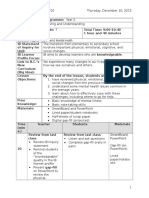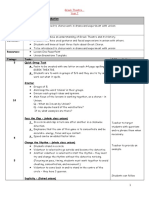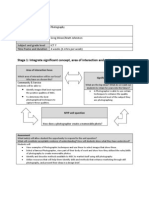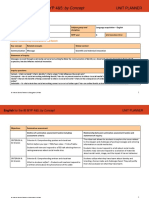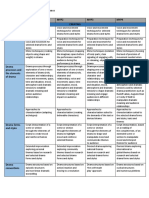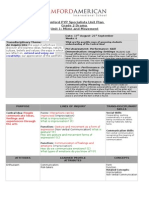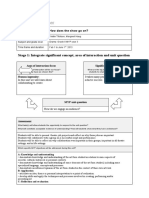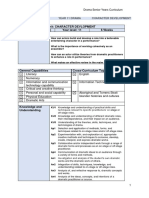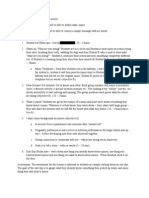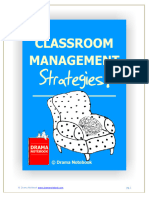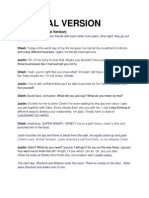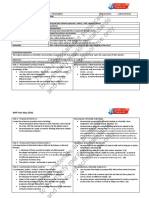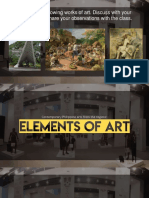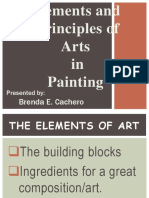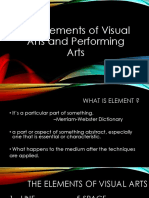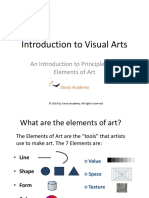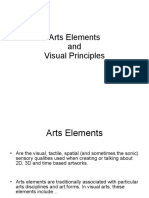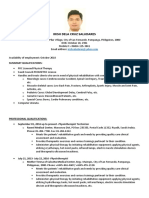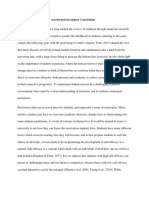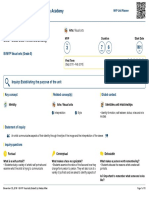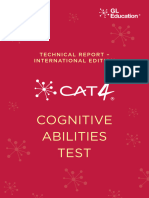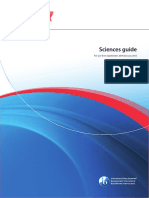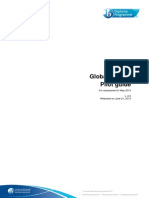MYP Unit Plan - Yr2 Drama
MYP Unit Plan - Yr2 Drama
Uploaded by
Ludwig Santos-Mindo De Varona-LptCopyright:
Available Formats
MYP Unit Plan - Yr2 Drama
MYP Unit Plan - Yr2 Drama
Uploaded by
Ludwig Santos-Mindo De Varona-LptOriginal Description:
Original Title
Copyright
Available Formats
Share this document
Did you find this document useful?
Is this content inappropriate?
Copyright:
Available Formats
MYP Unit Plan - Yr2 Drama
MYP Unit Plan - Yr2 Drama
Uploaded by
Ludwig Santos-Mindo De Varona-LptCopyright:
Available Formats
0Teacher(s) Mrs.
Hadir Ali Subject group and discipline Arts - Drama
Unit title End of the year Drama MYP year: Year 1 Unit duration 9
show/Pantomiming (Cycle) hours
Inquiry: Establishing the purpose of the unit
Key concept Related concept(s) Global context
Aesthetics, Communication, Composition, Boundaries, Identities and Relationships – Orientation in
and Identity. Interpretation, and Genre. space and time.
Students will explore personal,
physical, and social identities as well
as beliefs, and values.
Statement of inquiry
Audience get their aesthetic pleasures by watching composed plays influenced by identities and bound
by human relationships.
Inquiry questions
Factual
How was the art form changed over time?
Conceptual
How do the history and origin of drama reflect and echo cultural identities and human relationships?
Middle Years Programme Unit planner 1
Debatable
How does drama influence communities?
Objectives Summative assessment Relation between Summative and
statement of inquiry
Summative assessment: A: Knowing and Understanding i. ii iii
A Knowing and understanding Outline of summative assessment task(s) iv
including assessment criteria: B: Developing skills i. ii iii iv
Through the study of theorists and
practitioners of the arts, students - What task(s) will allow students the C: Thinking creatively i. ii iii iv
discover the aesthetics of art forms opportunity to respond to the unit question?
D: Responding i. ii iii iv
and are able to analyse and - What will constitute acceptable evidence
communicate in specialized of understanding? How will students show o Students demonstrate
language. Using explicit and tacit what they have understood? awareness of elements of
knowledge alongside an drama and theatrical
understanding of the role of the arts Summative Assesment One performing
in a global context, students inform Research on famous pantomiming o Use some basic language and
their work and artistic perspectives. short movies/scenes. have an in-depth
understanding of some of the
In order to reach the aims of arts,
-The student should be able to elaborate concepts and processes
students should be able to:
and explain the pantomiming scene they relating to Theatre arts
i. demonstrate knowledge and chose. o Learn skills and develop the
understanding of the art form techniques and processes
studied, including concepts, -There should be evidence of purposeful needed to create, perform
Middle Years Programme Unit planner 2
processes, and the use of subject- expression. Skills and techniques are applied and/or present Theatre, and
specific terminology at a high level of proficiency. apply them with some
ii. demonstrate an understanding of independence
the role of the art form in original or -The student should show an excellent o Describe the progress they
displaced contexts understanding and comprehension of the have made so far and identify
elements researched. areas that have been
iii. use acquired knowledge to particularly easy or challenging
purposefully inform artistic decisions -Students will use the performance with some detailed
in the process of creating artwork. assessment rubric to complete a self- explanation; identify and
reflection upon the completion of the describe strengths and
project and write a reflection in their weaknesses in their work
developmental workbook that responds to o Show commitment in using
B Developing skills and answers the unit question. theatrical processes
The acquisition and development of o Demonstrate curiosity, self-
skills provide the opportunity for motivation, initiative and a
active participation in the art form Task1: willingness to take informed
and in the process of creating art. Presentation: (Criteria A and D) risks
Skill application allows students to o Support, encourage and work
develop their artistic ideas to a point A group skit using subject- specific with their peers in a positive
of realization. The point of realization terminology of: way
could take many forms. However, it is Research into the art of acting that o Be receptive to Theatre
recognized as the moment when the shows people’s actions and emotions. practices and work from
student makes a final commitment to The famous pantomiming scenes of various cultures, including their
his or her artwork by presenting it to Drama. own.
an audience. Skills are evident in The critical analysis, stating where
both process and product. and when the scene took place
Middle Years Programme Unit planner 3
In order to reach the aims of arts, Task2:
students should be able to: Proposal: (Criteria C)
i. demonstrate the acquisition and
A selection of process journal extracts
development of the skills and
including:
techniques of the art form studied
The development of students’ artistic
ii. demonstrate the application of intention
skills and techniques to create,
Demonstration of a range and depth
perform and/or present art.
Objectives Arts guide 11 of creative- thinking behaviours of the
pantomiming scene itself.
C Thinking creatively Task3:
Process and Product: (Criteria B and C)
The arts motivate students to A selection of process journal extracts to
develop curiosity and purposefully show:
explore and challenge boundaries.
Thinking creatively encourages Students’ abilities to write and
students to explore the unfamiliar perform a short play on stage using
and experiment in innovative ways to the knowledge they have learned
develop their artistic intentions, their throughout the unit.
processes and their work. Thinking Students have to adopt a certain Era
creatively enables students to and write a 5 minute script that
discover their personal signature and reflects any of the chosen
realize their artistic identity. pantomiming scenes.
In order to reach the aims of arts,
Middle Years Programme Unit planner 4
Task 4:
students should be able to:
Commentary: (Criteria A and D)
i. develop a feasible, clear,
imaginative and coherent artistic
A commentary that includes:
intention
Evidence of the use of acquired
ii. demonstrate a range and depth of knowledge to inform the
creative-thinking behaviours development of student’s
iii. demonstrate the exploration of performance
ideas to shape artistic intention Evidence of student’s ability to
through a point of realization. construct meaning and transfer
learning into their artwork
D Responding The artistic response and the way in
Students should have the opportunity which it reflects or impacts on the
to respond to their world, to their own world.
art and to the art of others. A A critique of the student’s own
response can come in many forms; artwork including the ability to
creating art as a response convey the social and cultural
encourages students to make identities through the history of
connections and transfer their Drama.
learning to new settings. Through
reflecting on their artistic intention
and the impact of their work on an
audience and on themselves,
students become more aware of
their own artistic development and
the role that arts play in their lives
Middle Years Programme Unit planner 5
and in the world. Students learn that
the arts may initiate change as well
as being a response to change.
In order to reach the aims of arts,
students should be able to:
i. construct meaning and transfer
learning to new settings
ii. create an artistic response that
intends to reflect or impact on the
world around them
iii. critique the artwork of self and
others.
ATL Skills
o In order for students to demonstrate an understanding of the role of the art form in original or displaced contexts,
students should collect, record and verify data and make connections between various sources of information as
well as present information in a variety of formats and platform.(Category: Research / Cluster:Information literacy
skills)
o In order for students to demonstrate the exploration of ideas to shape artistic intention through a point of realization,
students should interpret data, consider ideas from multiple perspectives and gather and organize relevant
Middle Years Programme Unit planner 6
information to formulate an argument. (Category:Thinking/ Cluster: Critical- thinking skills)
Action: Teaching and learning through inquiry
Content Learning process
Learning Experience:
Students: o Defining drama elements.
o Reading about the history of drama and types of theatre
o understand how the arts play a role in o Discussing fundamentals of play production.
developing and expressing personal and o Introducing stage space: stage areas, actor’s positions,
cultural identities props …etc.
o appreciate how the arts innovate and o Excerpt play readings
communicate across time and culture
o Play performance
o become informed and reflective practitioners
of the arts
o experience the process of making theatre in a
Formative assessment:
variety of situations
o explore, express and communicate ideas o Inquiry teaching
o become more effective learners, inquirers and o Group work
thinkers o Peer Teaching
o develop self‐confidence and self‐awareness
o Performance assessments
through art experiences
o Teacher/Student demonstrations
o appreciate lifelong learning and enjoyment of
o Partner work
Middle Years Programme Unit planner 7
the arts. o Rehearsals
o Reflect on previous lesson
o share a few journal entries
o assess the goal and objectives for each day
• What is theatre?
What are the elements of Drama?
Research the origin of Drama.
Why are we trying to be better actors?
• Drama Journal*: This week, observe the people around you,
family,
friends, teachers, strangers. Choose one interesting person and
write three sentences describing them in your journal.
Differentation:
-The scope of explanation, observation, exploration and
application reflects variety of strategies and methodologies that
gives chance for every student to grasp and comprehend the
skills addressed.
-Each lesson starts with warm up activity, then progresses with
various means of explorations, along with varied and diverse
activities for each objective what gives students with different
levels a chance to get along with the curriculum.
Middle Years Programme Unit planner 8
Resources
Pantomiming in Theatre
pantomimng videos on youtube
Teachers’ handouts& worksheets
Teachers’ support material
Internet, presentations shown in class by teachers.
Reflection: Considering the planning, process and impact of the inquiry
Prior to teaching the unit During teaching After teaching the unit
o Students will be eager to know
about “What is theatre”?
o Students will be interested in
learning about the origin of
Drama as well as the different
elements of drama.
o Students will match their
background information about
stage performance and Actors
to what will be learnt in class.
o Students will feel excited to
Middle Years Programme Unit planner 9
practice and develop acting
skills
Middle Years Programme Unit planner
10
You might also like
- Pyp Scope Sequence - DramaDocument9 pagesPyp Scope Sequence - Dramaapi-353859154100% (8)
- Shakespeare Ubd Unit PlanDocument16 pagesShakespeare Ubd Unit Planapi-239477809No ratings yet
- Myp Lesson Plan TemplateDocument2 pagesMyp Lesson Plan Templateapi-292000448100% (5)
- IB MYP - Unit Planner GRADE 7Document6 pagesIB MYP - Unit Planner GRADE 7Terence Bundela100% (1)
- MYP Unit Plan - Yr1 DramaDocument10 pagesMYP Unit Plan - Yr1 DramaLudwig Santos-Mindo De Varona-Lpt100% (5)
- Myp Lesson Plan Example Health 1Document3 pagesMyp Lesson Plan Example Health 1api-292000448100% (2)
- MYP Improvisation Unit 2012 Theatre IDocument7 pagesMYP Improvisation Unit 2012 Theatre IMohammad IdreesiNo ratings yet
- MYP Arts Sample Unit Plan PDFDocument192 pagesMYP Arts Sample Unit Plan PDFiLoveQuran100% (1)
- Drama Lesson Plan Movement Based, Grade 3/4Document5 pagesDrama Lesson Plan Movement Based, Grade 3/4Colleen100% (8)
- O Sacred Heart O Love DivineDocument1 pageO Sacred Heart O Love DivineWin BerAngel100% (1)
- Theatre Class Syllabus For Middle SchoolDocument16 pagesTheatre Class Syllabus For Middle SchoolHannah Kelly100% (2)
- MYP Unit Planner 2 English-LanguageDocument5 pagesMYP Unit Planner 2 English-LanguageElizabeta Hristovska100% (4)
- Greek Theatre Lesson PlanDocument17 pagesGreek Theatre Lesson PlanyaraafslNo ratings yet
- MYP Unit Planner PhotographyDocument4 pagesMYP Unit Planner Photographymattjnz9950No ratings yet
- English For The IB MYP 4&5:: by ConceptDocument8 pagesEnglish For The IB MYP 4&5:: by ConceptDora Martinez50% (2)
- ART HISTORY (Art Movements, Styles and Famous Artists) : Inquiry: Establishing The Purpose of The UnitDocument7 pagesART HISTORY (Art Movements, Styles and Famous Artists) : Inquiry: Establishing The Purpose of The UnitDon jonathan100% (2)
- MYP 2 Drama Lesson Plan - Unit 2Document3 pagesMYP 2 Drama Lesson Plan - Unit 2Mohammad Idreesi100% (1)
- DRAMA MYP Scope & SequenceDocument3 pagesDRAMA MYP Scope & SequenceMohammad Idreesi100% (1)
- 2.1 Drama PlannerDocument3 pages2.1 Drama PlannerRachel DamonNo ratings yet
- Drama Curriculum For PrimaryDocument8 pagesDrama Curriculum For PrimaryRizki Pradana100% (1)
- MYP Lesson Plan - Greek TheatreDocument2 pagesMYP Lesson Plan - Greek TheatreAkshat Arora100% (2)
- Drama Lesson PlanDocument6 pagesDrama Lesson PlanMagpak Agpak100% (2)
- Theatre Lesson PlansDocument91 pagesTheatre Lesson PlansAdina-Mihaela Malanciuc100% (7)
- Drama UnitDocument31 pagesDrama Unittttyzen100% (4)
- Drama in SchoolsDocument72 pagesDrama in Schoolsodyfils100% (4)
- Element Checklist For MYP Unit Planners: Does The Unit Include The Following?Document8 pagesElement Checklist For MYP Unit Planners: Does The Unit Include The Following?Shantha KundapuraNo ratings yet
- 1-Numbers MYP2Document15 pages1-Numbers MYP2parth100% (1)
- We All Have Stories To Tell BiographyDocument3 pagesWe All Have Stories To Tell Biographyapi-259496801No ratings yet
- MYP Unit Plan - Yr3 DramaDocument10 pagesMYP Unit Plan - Yr3 DramaLudwig Santos-Mindo De Varona-Lpt100% (1)
- MYP Unit Plan - Grade 10Document10 pagesMYP Unit Plan - Grade 10Ludwig Santos-Mindo De Varona-LptNo ratings yet
- MYP Unit Plan - Grade 9Document10 pagesMYP Unit Plan - Grade 9Ludwig Santos-Mindo De Varona-LptNo ratings yet
- MYP1 Unit-DRAMADocument4 pagesMYP1 Unit-DRAMAMohammad Idreesi100% (1)
- Unit 1 Myp Unit Planner DiDocument3 pagesUnit 1 Myp Unit Planner DiJelena HajoševićNo ratings yet
- MYP Unit Overviews 2012 2013 - FDR HomeDocument91 pagesMYP Unit Overviews 2012 2013 - FDR HomeHenrique Dias100% (1)
- Drama Stage 2 ExplorersDocument6 pagesDrama Stage 2 Explorersapi-459326447100% (1)
- Middle Years Programme Unit PlannerDocument6 pagesMiddle Years Programme Unit PlannerSakshi Viradia100% (1)
- Course Overviews MYP Drama Course, UWC Thailand 2020-2021: - ArtistryDocument4 pagesCourse Overviews MYP Drama Course, UWC Thailand 2020-2021: - ArtistryJelena HajoševićNo ratings yet
- MYP 3 Unit PlannerDocument5 pagesMYP 3 Unit PlannerGetsy BijoyNo ratings yet
- MYP Unit Planner: Stage 1: Integrate Significant Concept, Area of Interaction and Unit QuestionDocument4 pagesMYP Unit Planner: Stage 1: Integrate Significant Concept, Area of Interaction and Unit QuestionJelena HajoševićNo ratings yet
- MYP Drama Subject Overview 2016 2017Document11 pagesMYP Drama Subject Overview 2016 2017ricky fiascoNo ratings yet
- 58 Explore Identity Through DramaDocument20 pages58 Explore Identity Through DramaSisim24No ratings yet
- Year 11 Drama Unit of Work - Chris ScapensDocument31 pagesYear 11 Drama Unit of Work - Chris Scapensapi-378246480No ratings yet
- Arts Drama MYP4 MYP5 Course DescriptionDocument7 pagesArts Drama MYP4 MYP5 Course DescriptionMarcela GrandolphoNo ratings yet
- IB Theatre Survival GuideDocument4 pagesIB Theatre Survival Guideshadenhs100% (1)
- Creative DramaDocument34 pagesCreative DramaConnie Husny67% (6)
- Drama Long Range UploadDocument8 pagesDrama Long Range Uploadapi-300773127No ratings yet
- Myp Unit Planner Y8 Term 2Document5 pagesMyp Unit Planner Y8 Term 2Alinda Nurul BadriyahNo ratings yet
- Mime Lesson PlanDocument2 pagesMime Lesson PlanAlex Baranosky100% (1)
- DN Script The Swan and The RubbishDocument8 pagesDN Script The Swan and The RubbishMaria Andreina MontañezNo ratings yet
- MYP Unit 3Document8 pagesMYP Unit 3katiesav5006064100% (1)
- 2014-2015 8th Grade Drama Curriculum MapDocument4 pages2014-2015 8th Grade Drama Curriculum Mapapi-254712134No ratings yet
- Drama For Kids A Mini Unit On Emotions and Character F 2Document5 pagesDrama For Kids A Mini Unit On Emotions and Character F 2api-355762287No ratings yet
- Theatre As A Weapon BoalDocument13 pagesTheatre As A Weapon Boalapi-293098706No ratings yet
- PYP Stand Alone PYPDocument5 pagesPYP Stand Alone PYPFukcOffNo ratings yet
- Unit 9 Devising Plays PDFDocument9 pagesUnit 9 Devising Plays PDFGabo TolentinoNo ratings yet
- DN Classroom Management StrategiesDocument14 pagesDN Classroom Management StrategiesLisa McCormackNo ratings yet
- Unit Plan 1-Force and Motion Ii F5Document7 pagesUnit Plan 1-Force and Motion Ii F5ayydenNo ratings yet
- 10 Minute Detective PlayDocument13 pages10 Minute Detective PlayQiwei Fu100% (1)
- Drama Lesson PlansDocument13 pagesDrama Lesson Plansapi-446566858100% (2)
- Electronic Music Sample Unit PlannerDocument7 pagesElectronic Music Sample Unit Plannerponeetsharma100% (1)
- Partially Completed Unit Planner For The ArtsDocument5 pagesPartially Completed Unit Planner For The ArtsesusoNo ratings yet
- Cinematic TheatreDocument5 pagesCinematic TheatreJonathon Lawrence FreemanNo ratings yet
- Ge 20 Reading Visual Arts SyllabusDocument12 pagesGe 20 Reading Visual Arts SyllabusImeng Migabon100% (1)
- ASSESSMENT-PLAN-Odri and Jay AnnDocument8 pagesASSESSMENT-PLAN-Odri and Jay Annaudreyberroya2003No ratings yet
- Lesson D Self PortraitDocument5 pagesLesson D Self Portraitapi-445284664No ratings yet
- Perspective Drawing: Freehand and MechanicalFrom EverandPerspective Drawing: Freehand and MechanicalRating: 5 out of 5 stars5/5 (1)
- Music Makes People HappyDocument2 pagesMusic Makes People HappyLudwig Santos-Mindo De Varona-LptNo ratings yet
- SpeechDocument12 pagesSpeechLudwig Santos-Mindo De Varona-LptNo ratings yet
- Anish MEN: A E FM CM D E Sus4 E ADocument2 pagesAnish MEN: A E FM CM D E Sus4 E ALudwig Santos-Mindo De Varona-LptNo ratings yet
- Cpar Elementsofart 180407210311Document22 pagesCpar Elementsofart 180407210311Ludwig Santos-Mindo De Varona-LptNo ratings yet
- Elementsofarts Painting 180605132721Document71 pagesElementsofarts Painting 180605132721Ludwig Santos-Mindo De Varona-LptNo ratings yet
- Hum 150816103846 Lva1 App6891 PDFDocument172 pagesHum 150816103846 Lva1 App6891 PDFLudwig Santos-Mindo De Varona-Lpt100% (2)
- For RoosterDocument10 pagesFor RoosterLudwig Santos-Mindo De Varona-Lpt100% (1)
- Organization in The Visual Arts: Principles of DesignDocument58 pagesOrganization in The Visual Arts: Principles of DesignLudwig Santos-Mindo De Varona-LptNo ratings yet
- Different: Art ofDocument24 pagesDifferent: Art ofLudwig Santos-Mindo De Varona-LptNo ratings yet
- Artslides Principleselements 161128172553Document71 pagesArtslides Principleselements 161128172553Ludwig Santos-Mindo De Varona-LptNo ratings yet
- Dr. Carla PiperDocument7 pagesDr. Carla PiperLudwig Santos-Mindo De Varona-LptNo ratings yet
- Arts Elements and Visual PrinciplesDocument50 pagesArts Elements and Visual PrinciplesLudwig Santos-Mindo De Varona-LptNo ratings yet
- San Lorenzo RuizDocument2 pagesSan Lorenzo RuizLudwig Santos-Mindo De Varona-LptNo ratings yet
- Hymns For The 4 Sunday of Easter BDocument2 pagesHymns For The 4 Sunday of Easter BLudwig Santos-Mindo De Varona-LptNo ratings yet
- Songs For The Blessed Virgin MaryDocument3 pagesSongs For The Blessed Virgin MaryLudwig Santos-Mindo De Varona-Lpt100% (1)
- Art Grading Rubric Middle and HighschoolDocument1 pageArt Grading Rubric Middle and HighschoolLudwig Santos-Mindo De Varona-LptNo ratings yet
- Irish Dela Cruz Saludares: Summary QualificationsDocument3 pagesIrish Dela Cruz Saludares: Summary QualificationsLudwig Santos-Mindo De Varona-LptNo ratings yet
- Claudia Castillo: EducationDocument2 pagesClaudia Castillo: Educationapi-245447109No ratings yet
- IB MYP Project Assessment GuideDocument2 pagesIB MYP Project Assessment GuideChristopher ClarkNo ratings yet
- Lit Review 1Document30 pagesLit Review 1api-433424489No ratings yet
- DP Self-Study Questionnaire (Group 3)Document33 pagesDP Self-Study Questionnaire (Group 3)jfyedra100% (1)
- Talk The Tok and Walk The Wok ThesisDocument254 pagesTalk The Tok and Walk The Wok ThesisHuiNo ratings yet
- Hague Expo 2017Document38 pagesHague Expo 2017angelicanierras100% (1)
- Myp Unit 4 PlannerDocument7 pagesMyp Unit 4 Plannerscience ten0% (1)
- MYP Year End Report May 2022 Grade 6 Charapalle Koushik 18HYD0215Document5 pagesMYP Year End Report May 2022 Grade 6 Charapalle Koushik 18HYD0215vaikuntakoushikNo ratings yet
- Sciences - MYP 5 - Chemistry Scope and Pacing 1 - 2011-2012 RevisedDocument4 pagesSciences - MYP 5 - Chemistry Scope and Pacing 1 - 2011-2012 RevisedrbgrossNo ratings yet
- Ibmyp Approaches To Learning Atl Continuum Documnet - May 2013Document10 pagesIbmyp Approaches To Learning Atl Continuum Documnet - May 2013api-283502298No ratings yet
- 12 5 The Still Life Value and ScratchboardsDocument9 pages12 5 The Still Life Value and Scratchboardsapi-247455001100% (2)
- 2 3cc Myp Unit Planner 2013 Year 8 Music PracDocument3 pages2 3cc Myp Unit Planner 2013 Year 8 Music Pracapi-229273655No ratings yet
- International Baccalaureate Middle Years Programme Class MYP IIDocument2 pagesInternational Baccalaureate Middle Years Programme Class MYP IIRohma UmairNo ratings yet
- A Visual Guide To The IB Diploma Programme: From Principles To Playbook!Document74 pagesA Visual Guide To The IB Diploma Programme: From Principles To Playbook!Kathleen SzalayNo ratings yet
- Dubai N Auh School ListsDocument56 pagesDubai N Auh School ListsBenish Fatima100% (1)
- Unit 2 - Chuck Close Portrait Grid Drawing 12 5Document13 pagesUnit 2 - Chuck Close Portrait Grid Drawing 12 5api-247455001100% (3)
- MYP Science Assessment Criteria OverviewDocument13 pagesMYP Science Assessment Criteria OverviewZhaosheng TaoNo ratings yet
- Cat4 International Technical ReportDocument37 pagesCat4 International Technical ReporttanmandarinNo ratings yet
- Personal Project at IsnsDocument5 pagesPersonal Project at Isnsapi-422489250No ratings yet
- MYP Science GuideDocument65 pagesMYP Science Guide안지연No ratings yet
- Final Conflict PaperDocument7 pagesFinal Conflict Paperapi-253087215No ratings yet
- Global Politics IB GuideDocument67 pagesGlobal Politics IB GuideMikeyJohn100% (1)
- The Role of ICT in PYPDocument10 pagesThe Role of ICT in PYPMarco PereiraNo ratings yet
- MYP Subject Criteria and Grade BoundariesDocument6 pagesMYP Subject Criteria and Grade BoundariesKumutha Chelliah100% (1)
- ToK Guide New 2022 PDFDocument58 pagesToK Guide New 2022 PDFTony G100% (1)





